A VERY brief article (700 words) on the recent events with the four schismatic bishops having their ex communication lifted by Pope Benedict last week. The Wall Street Journal article is found here.
Category: Theology
Blessed John Duns Scotus: A model for maintaining faith & reason
Pope Benedict XVI wrote a letter to the Archbishop of Cologne and those participating in the International Scientific Congress on the occasion of the seventh centenary of Blessed John Duns Scotus’ death. What relevance does a letter was written in October 2008 by the pope have for us today? Why remember Blessed John at all? Faith and reason working together in the heart of the Church!!! They are not in opposition to each other. Catholics are known to work intimately with faith and reason and Scotus is a prime example of the tradition. But you don’t need me to tell you that.
Read the pope:
Rejoice, City of Cologne, which once welcomed within your walls John Duns Scotus, a most learned and devout man, who passed from this life to the heavenly Homeland on 8 November 1308; and, whose remains you preserve with great admiration and veneration.
Our Venerable Predecessors, the Servants of God Paul VI and John Paul II, exalted him with lofty praise; we too would like to surround him with the praise he deserves and invoke his protection.
Thus the seventh centenary of his pious passing is now being celebrated, as is only right. And while articles and entire works in honour of Bl. John Duns Scotus are being published in various parts of the world and congresses are being held, including the solemn Congress currently being prepared that will take place in Cologne from 5 to 9 November 2008, we consider it a duty of our service in this circumstance to say a few words about this most illustrious man who so distinguished himself by contributing to the progress of the doctrine of the Church and of human science.
Indeed, combining piety with scientific research, in accordance with his invocation: “May the First Principle of things grant me to believe, to understand and to reveal what may please his majesty and may raise our minds to contemplate him”, with his refined brilliance he penetrated so deeply the secrets of natural and revealed truth, and found in them a doctrine which led him to be called Doctor Ordinis, Doctor Subtilis, and Doctor Marianus, becoming a teacher and guide of the Franciscan School, a light and example to the entire Christian People.
Thus we desire to remind scholars and everyone, believers and non-believers alike, of the path and method that Scotus followed in order to establish harmony between faith and reason, defining in this manner the nature of theology in order constantly to exalt action, influence, practice and love rather than pure speculation; in fulfilling this task he let himself be guided by the Magisterium of the Church and by a sound critical sense regarding growth in knowledge of the truth and was convinced that knowledge is valuable to the extent that it is applied in praxis.
Firmly anchored to the Catholic faith, Duns Scotus strove to understand, explain and defend the truth of the faith in the light of human reason. Thus he strove to do nothing other than show the consonance of all truths, natural and supernatural, that come from one and the same Source.
Alongside Sacred Scripture, divinely inspired, is the authority of the Church. Duns Scotus seems to follow St Augustine’s words: “I would not believe the Gospel, except that I [first] believe the Catholic Church”. In fact, our Doctor often gives a special emphasis to the supreme authority of the Successor of Peter. As the Blessed said: “Although the Pope cannot dispense with natural and divine law (given that his power is inferior to both), being the Successor of Peter, Prince of the Apostles, he still has the same authority as had Peter”.
Therefore, the Catholic Church whose invisible Head is Christ himself, who left as his Vicars the person of Blessed Peter and his Successors guided by the Spirit of truth, is the authentic custodian of the revealed deposit and the rule of faith. The Church is the firm and permanent criterion of the canonical dimension of Sacred Scripture. Indeed, she “established which books of the biblical canon were to be held authentic”.
Elsewhere he states that “the Scriptures were revealed in the same Spirit in which they were written, and in this way one must consider that the Catholic Church has presented them in that same Spirit with which the faith has been passed down, guided that is, by the Spirit of truth”.
After having proven with various arguments taken from theological reason, the very fact that the Blessed Virgin Mary was preserved from original sin, he was absolutely ready also to reject this conviction should it not be in harmony with the authority of the Church, saying: “We can with probability attribute to Mary all that has the greatest perfection, provided it is not opposed to the authority of the Church or the Scriptures”.
The primacy of the will sheds light on the fact that God is charity before all else. This charity, this love, Duns Scotus kept present when he sought to lead theology back to a single expression, that is to practical theology. According to his thought, since God “is formally love and formally charity”, with the greatest generosity he radiates his goodness and love beyond himself. And in reality, it is for love that God “chose us in him before the foundation of the world, that we should be holy and blameless before him. He predestined us in love to be his adoptive sons through Jesus Christ” (cf. Eph 1: 4-5).
A faithful disciple of St Francis of Assisi, Bl. John contemplated and preached assiduously the Incarnation and the saving Passion of the Son of God. However, the charity or love of Christ is expressed in a special way not only on Calvary, but also in the most holy Sacrament of the Eucharist, without which “if not for being able to render supreme adoration unto God through the veneration of the same Sacrament every mercy would disappear in the Church”. This Sacrament moreover is a sacrament of unity and love; through it we are led to love one another mutually and to love God as a common good and to be loved at the same time by others.
And as this love, this charity, was the origin of all things, so too our eternal happiness will be in love and charity alone: “Eternal life is simply the desire as well as the will to love, blessed and perfect”.
Since at the beginning of our ministry we first of all preached love, which is God himself, we see with joy that the unique doctrine of this Blessed keeps a special place for this truth, which we consider principally worthy to be researched and taught in our time. Therefore, willingly complying with the request of our Venerable Brother Cardinal Joachim Meisner, of Holy Roman Church, Archbishop of Cologne, we are sending this Apostolic Letter with which we desire to honour Bl. John Duns Scotus and invoke his heavenly intercession upon us. Lastly, to those who are taking part in any capacity in this International Congress and in other initiatives concerning this outstanding son of St Francis, we cordially impart our Apostolic Blessing.
Given in Rome, at St Peter’s on 28 October 2008, the fourth year of our Pontificate.
BENEDICTVS PP. XVI
The epitaph at Blessed John’s grave is rather fun:
Scotland bore me, Scotia me genuit,
England received me, Anglia me suscepit,
France taught me, Gallia me docuit,
Cologne holds me. Colonia me tenet.
Can we think of advancing his cause for sainthood? Its taken too many years to get to “Blessed”!!!!
footnotes in the original, see vatican.va
Haight speech about Christ muzzled
The Church has judged that Jesuit Father Roger Haight’s writings are beyond the limits of orthodox theological reflection on the nature of Christ (Christology).
Either one is a Catholic theologian teaching orthodox theology or you don’t teach. The problem with Father Haight is that Church’s objectivity is reduced to school yard monitor and while he is an ordained Catholic priest, Haight very rarely celebrates the Mass. AND then there is his own admission that he considers himself not a Catholic theologian but a Christian theologian. I suppose that’s what you get when a Catholic priest destined to teach priesthood candidates is educated by the Baptists. The objectivity of the Faith means something: one, holy, catholic and apostolic for starters.
Once asked if he would revise his thinking/publications sentire cum Ecclesiae so that he could be missioned by the Jesuits to teach, Father Haight told two scores of Jesuit seminarians that he would not do so. I guess that is what is called by many Jesuits “loyal opposition to the Church.” Of course, if you understand the Church to be a sacrament founded by Christ then saying no to the Church is saying no to Christ. Does this remind you of a conversion story from the Acts of Apostles where the protagonist in the narrative hears said: “…why are you persecuting me?”
Sandro Magister’s article
The 2004 CDF notification on Jesus, Symbol of God
As Jesuit Father Gerald O’Collins once said: “I wouldn’t give my life for Roger Haight’s Jesus. It’s a triumph of relevance over orthodoxy.” Neither would I, would you?
Beginnings, translations and God’s Plans
Rusty Reno tackles the question of where to begin when considering our life in God in his First Things essay, “In The Beginning.” Reno provokes me to ask a few questions. Where do we begin, when, why and for what purpose? What is our destiny, in other words? Where do our loyalties exist? Are we wedded too much to our ideas? That is, are we blinded to a particular theological lens and biblical interpretation that when truth is presented we pass it by because we are too comfortable in our belief system? If we are rigidly following what we think is right versus wrong will we ever advance in wisdom, grace and love? AND the problem is thus exposed: who’s wisdom, grace and love are living in? God’s or ours? What place does Torah and the Gospel have in our lives? Do we follow a political personality or Jesus, the Savior?
Theological Education in 21st Century: an Orthodox bishop’s perspective
I am presenting excerpts of a lecture delivered by Russian Orthodox Bishop Hilarion Alfeyev at the Wycliffe College, University of Toronto, October 21, 2008. This work was made known to me by a friend, Paulist Father Ron Roberson heads the Orthodox desk for the US Bishops ecumenical office in Washington, DC. The emphasis I added to the lecture are the ideas that are striking deserve greater attention by us. The keys are “personal encounter,” and the lex orandi tradition and being conscious of the great divorce of faith and reason. Thanks for your patience.
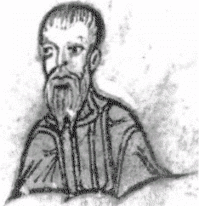 According to a classical definition by Evagrius, ‘If you are a theologian, you will pray truly. And if you pray truly, you are a theologian’. In traditional Orthodox understanding, theology is not a science, or a scholarship, or an academic exercise. To be a theologian means to have experience of a personal encounter with God through prayer and worship.
According to a classical definition by Evagrius, ‘If you are a theologian, you will pray truly. And if you pray truly, you are a theologian’. In traditional Orthodox understanding, theology is not a science, or a scholarship, or an academic exercise. To be a theologian means to have experience of a personal encounter with God through prayer and worship.
Theology ought to be inspired by God: it ought not to be the word of a human person, but the word of the Spirit pronounced by human lips. A true Christian theologian is one who is able to be silent until the Holy Spirit touches the strings of his soul. And it is only when the human word falls silent and the word of the Spirit emerges from his soul, that true theology is born. From this moment ‘a lover of words’ is transformed into ‘a lover of wisdom’, a rhetorician into a theologian.
According to St Gregory Nazianzen, not everyone can be a theologian, but only the one who purifies himself for God. Not all can participate in theological discussions, but only those who are able to do it properly. Finally, not every theological concern can be discussed openly.
Discussion of theology is not for everyone, I tell you, not for everyone – it is not such inexpensive and effortless pursuit… It must be reserved for certain occasions, for certain audiences, and certain limits must be observed. It is not for all men, but only for those who have been tested and have found a sound footing in study, and, more importantly, have undergone, or at the very least are undergoing, purification of body and soul.
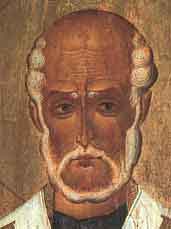 Theology, according to St Gregory, is nothing other than the ascent to God. Gregory uses the traditional image of Moses on Mount Sinai to emphasize that the true theologian is only someone who is able to enter the cloud and encounter God face to face. In this multi-dimensional, allegorical picture Moses symbolizes the person whose theology emerges from the experience of an encounter with God. Aaron represents someone whose theology is based on what he heard from others; Nadab and Abihu typify those who claim to be theologians because of their high position in the church hierarchy. But neither acquaintance with the experience of others nor an ecclesiastical rank gives one the right to declare oneself a theologian. Those Christians who purify themselves according to God’s commandments may take part in a theological discussion; the non-purified ought not.
Theology, according to St Gregory, is nothing other than the ascent to God. Gregory uses the traditional image of Moses on Mount Sinai to emphasize that the true theologian is only someone who is able to enter the cloud and encounter God face to face. In this multi-dimensional, allegorical picture Moses symbolizes the person whose theology emerges from the experience of an encounter with God. Aaron represents someone whose theology is based on what he heard from others; Nadab and Abihu typify those who claim to be theologians because of their high position in the church hierarchy. But neither acquaintance with the experience of others nor an ecclesiastical rank gives one the right to declare oneself a theologian. Those Christians who purify themselves according to God’s commandments may take part in a theological discussion; the non-purified ought not.
Thus, purification of soul is a necessary precondition for practicing theology. Its central point is summed up in the following dictum: ‘Is speaking about God a great thing? But greater still is to purify oneself for God’. Here, purification (katharsis) is not opposed to theology: rather, theology is that ascent to the peak of Mount Sinai which is impossible without purification. What is required for practicing theology is not so much intellectual effort, neither external erudition, nor wide reading, but first of all humility and modesty. According to Gregory, humility is not to be found in someone’s external appearance, which may often be deceitful, and perhaps not even in how someone is related to other people, but in his attitude to God. The humble, in Gregory’s judgment, is not he who speaks but little about himself, or who speaks in the presence of a few but rarely; not he who ‘speaks about God with moderation, who knows what to say and what to pass over in silence’.
In other words, everyone can be a good Christian, but not everyone is able to investigate the depths of doctrine, where many things should be covered by an apophatic silence. Everyone can contemplate on matters of theology, but not everyone can be initiated into its mysteries.
All Christians must purify themselves for God: the more a person is purified, the more discernible are the words of the Spirit in his mouth. True theology is born out of a silent and humble standing before God rather than out of speculations on theological matters. We can see that this understanding is radically different from what we normally mean by ‘theology’. One of the tragic consequences of the divorce between Christian theory and praxis, between faith and knowledge, is that nowadays knowledge about theological subjects does not necessarily presuppose faith. You can be a theologian and not belong to any church community; in principle, you do not need to believe in God to receive a theological degree. Theology is reduced to one of the subjects of human knowledge alongside with chemistry, mathematics or biology.
Another divorce which needs to be mentioned is that between theology and liturgy.
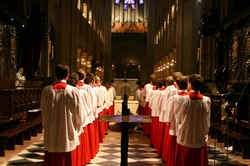 For an Orthodox theologian, liturgical texts are not simply the works of outstanding theologians and poets, but also the fruits of the prayerful experience of those who have attained sanctity and theosis. The theological authority of liturgical texts is, in my opinion, higher than that of the works of the Fathers of the Church, for not everything in the works of the latter is of equal theological value and not everything has been accepted by the fullness of the Church. Liturgical texts, on the contrary, have been accepted by the whole Church as a ‘rule of faith’ (kanon pisteos), for they have been read and sung everywhere in Orthodox churches over many centuries.
For an Orthodox theologian, liturgical texts are not simply the works of outstanding theologians and poets, but also the fruits of the prayerful experience of those who have attained sanctity and theosis. The theological authority of liturgical texts is, in my opinion, higher than that of the works of the Fathers of the Church, for not everything in the works of the latter is of equal theological value and not everything has been accepted by the fullness of the Church. Liturgical texts, on the contrary, have been accepted by the whole Church as a ‘rule of faith’ (kanon pisteos), for they have been read and sung everywhere in Orthodox churches over many centuries.
Throughout this time, any erroneous ideas foreign to Orthodoxy that might have crept in either through misunderstanding or oversight were eliminated by church Tradition itself, leaving only pure and authoritative doctrine clothed by the poetic forms of the Church’s hymns.
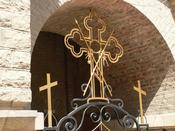 Several years ago I came across a short article in a journal of the Coptic Church where it stated that this Church had decided to remove prayers for those detained in hell from its service books, since these prayers ‘contradict Orthodox teaching.’ Puzzled by this article, I decided to ask a representative of the Coptic Church about the reasons for this move. When such opportunity occurred, I raised this question before one Coptic metropolitan, who replied that the decision was made by his Synod because, according to their official doctrine, no prayers can help those in hell. I told the metropolitan that in the liturgical practice of the Russian Orthodox Church and other local Orthodox Churches there are prayers for those detained in hell, and that we believe in their saving power. This surprised the metropolitan, and he promised to study this question in more detail.
Several years ago I came across a short article in a journal of the Coptic Church where it stated that this Church had decided to remove prayers for those detained in hell from its service books, since these prayers ‘contradict Orthodox teaching.’ Puzzled by this article, I decided to ask a representative of the Coptic Church about the reasons for this move. When such opportunity occurred, I raised this question before one Coptic metropolitan, who replied that the decision was made by his Synod because, according to their official doctrine, no prayers can help those in hell. I told the metropolitan that in the liturgical practice of the Russian Orthodox Church and other local Orthodox Churches there are prayers for those detained in hell, and that we believe in their saving power. This surprised the metropolitan, and he promised to study this question in more detail.
During this conversation with the metropolitan I expressed my thoughts on how one could go very far and even lose important doctrinal teachings in the pursuit of correcting liturgical texts. Orthodox liturgical texts are important because of their ability to give exact criteria of theological truth, and one must always confirm theology using liturgical texts as a guideline, and not the other way round. The lex credendi grows out of the lex orandi, and dogmas are considered divinely revealed because they are born in the life of prayer and revealed to the Church through its divine services. Thus, if there are divergences in the understanding of a dogma between a certain theological authority and liturgical texts, I would be inclined to give preference to the latter. And if a textbook of dogmatic theology contains views different from those found in liturgical texts, it is the textbook, not the liturgical texts, that need correction. Even more inadmissible, from my point of view, is the correction of liturgical texts in line with contemporary norms. Relatively recently the Roman Catholic Church decided to remove the so-called ‘antisemitic’ texts from the service of Holy Friday. Several members of the Orthodox Church have begun to propagate the idea of revising Orthodox services in order to bring them closer to contemporary standards of political correctness. For example, the late Archpriest Serge Hackel from England, an active participant in the Jewish-Christian dialogue, proposed the removal of all texts from the Holy Week services that speak of the guilt of the Jews in the death of Christ (cf. his article “How Western Theology after Auschwitz Corresponds to the Consciousness and Services of the Russian Orthodox Church,” in Theology after Auschwitz and its Relation to Theology after the Gulag: Consequences and Conclusions, Saint Petersburg, 1999; in Russian). He also maintains that only a ‘superficial and selective’ reading of the New Testament brings the reader to the conclusion that the Jews crucified Christ.
In reality, he argues, it was Pontius Pilate and the Roman administration who are chiefly responsible for Jesus’ condemnation and crucifixion. This is just one of innumerable examples of how a distortion of the lex credendi inevitably leads to ‘corrections’ in the lex orandi, and vice versa. This is not only a question of revising liturgical tradition, but also a re-examination of Christian history and doctrine. The main theme of all four Gospels is the conflict between Christ and the Jews, who in the end demanded the death penalty for Jesus. There was no conflict between Christ and the Roman administration, the latter being involved only because the Jews did not have the right to carry out a death penalty. It seems that all of this is so obvious that it does not need any explanation. This is exactly how the ancient Church understood the Gospel story, and this is the understanding that is reflected in liturgical texts. However, contemporary rules of ‘political correctness’ demand another interpretation in order to bring not only the Church’s services, but also the Christian faith itself in line with modern trends.
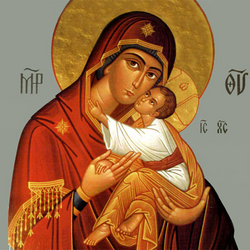 The Orthodox Tradition possesses a sufficient number of ‘defense mechanisms’ that prevent foreign elements from penetrating into its liturgical practice. I have in mind those mechanisms that were set in motion when erroneous or heretical opinions were introduced into the liturgical texts under the pretext of revision. One may recall how Nestorianism began with the suggestion to replace the widely-used term Theotokos (Mother of God) with Christotokos (Mother of Christ), the latter was seen as more appropriate by Nestorius. When this suggestion was made, one of the defense mechanisms was activated: the Orthodox people were indignant and protested. Later, another mechanism was put into operation when theologians met to discuss the problem. Finally, an Ecumenical Council was convened. Thus, it turned out that a dangerous Christological heresy, lurking under the guise of a seemingly harmless liturgical introduction, was later condemned by a Council.
The Orthodox Tradition possesses a sufficient number of ‘defense mechanisms’ that prevent foreign elements from penetrating into its liturgical practice. I have in mind those mechanisms that were set in motion when erroneous or heretical opinions were introduced into the liturgical texts under the pretext of revision. One may recall how Nestorianism began with the suggestion to replace the widely-used term Theotokos (Mother of God) with Christotokos (Mother of Christ), the latter was seen as more appropriate by Nestorius. When this suggestion was made, one of the defense mechanisms was activated: the Orthodox people were indignant and protested. Later, another mechanism was put into operation when theologians met to discuss the problem. Finally, an Ecumenical Council was convened. Thus, it turned out that a dangerous Christological heresy, lurking under the guise of a seemingly harmless liturgical introduction, was later condemned by a Council.
To rediscover the link between theology, liturgy and praxis, between lex orandi, lex credendi and lex Vivendi would be one of the urgent tasks of theological education in the 21st century. The whole notion of a ‘theology’ as exclusively bookish knowledge must be put into question. The whole idea of a ‘theological faculty’ as one of many other faculties of a secular university needs to be re-examined. The notions of ‘nonconfessional’, ‘unbiased’, ‘objective’ or ‘inclusive’ theology as opposed to ‘confessional’ or ‘exclusive’ must be reconsidered.
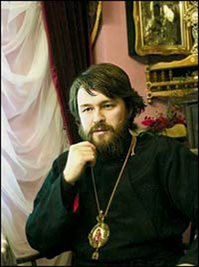 Hilarion Alfeyev was born on July 24, 1966 in Moscow. He studied violin, piano and composition. He graduated in 1991 with a Master of Theology from the Moscow Theological Academy. In 1995, Alfeyev earned a doctorate from the University of Oxford (UK) under the supervision of Bishop Kallistos Ware writing defending a thesis titled “St Symeon the New Theologian and Orthodox Tradition.”
Hilarion Alfeyev was born on July 24, 1966 in Moscow. He studied violin, piano and composition. He graduated in 1991 with a Master of Theology from the Moscow Theological Academy. In 1995, Alfeyev earned a doctorate from the University of Oxford (UK) under the supervision of Bishop Kallistos Ware writing defending a thesis titled “St Symeon the New Theologian and Orthodox Tradition.”
He entered the Monastery of the Holy Spirit in Vilnius, Lithuania, where he was tonsured as a monk, ordained a deacon and a ordained priest in 1987. His bishop assigned him to serve as parish priest in Lithuania, including two years as dean of Annunciation Cathedral in Kaunas.
From 1995 to 2001 Hilarion Alfeyev served as Secretary for Inter-Christian Affairs of the Department for External Church Relations of the Moscow Patriarchate. He also taught part time at Smolensk and Kaluga Theological Seminaries (Russia), at St Vladimir’s and St Herman’s Theological Seminaries (USA) and at Cambridge University (UK).
On 27 December 2001, Alfeyev was elected a bishop and consecrated by His Holiness Alexy II, Patriarch of Moscow and all Russia in January 2002. The Patriarch assigned him to serve as an Assistant Bishop in the Diocese of Sourozh in Great Britain until the Holy Synod decided, only a few months later, that he was to be nominated as Head of the Representation of the Russian Orthodox Church to the European Institutions in Brussels. Since May 2003 he has served as Bishop of Vienna and Austria, administrator of the Diocese of Budapest and Hungary, in addition to his position in Brussels, which he continues to hold.
Bishop Hilarion has authored numerous musical compositions including “St Matthew Passion,” grand oratorio for soloists, choir and orchestra, with performances at the Great Hall of Moscow Concervatory, the Auditorium Conciliazione, Rome and at St Patrick’s Cathedral, Melbourne. Equally well received was his 2008 “Christmas Oratorio,” performed in Washington, Boston and New York and later in Moscow.
The Fellowship of the Unashamed
Mission Statement
I AM A PART of the Fellowship of the Unashamed.
The die has been cast. The decision has been made. I have stepped over the line. I won’t look back, let up, slow down, back away or be still.
My past is redeemed, my present makes sense, and my future is in God’s hands. I am finished and done with low living, sight walking, small planning, the bare minimum, smooth knees, colorless dreams, tamed visions, mundane talking, frivolous living, selfish giving, and dwarfed goals.
I no longer need preeminence, prosperity, position, promotions, applause, or popularity. I don’t have to be right, first, the best, recognized, praised, regarded, or rewarded. I now live by faith. I lean on Christ’s presence. I love with patience, live by prayer, and labor with the power of God’s grace.
My face is set. My gait is fast, my goal is heaven. My road is narrow, my way is rough, my companions are few, my Guide is reliable, and my mission is clear.
I cannot be bought, compromised, detoured, lured away, turned back, deluded, or delayed. I will not flinch in the face of sacrifice, hesitate in the presence of adversity, negotiate at the table of the enemy, ponder at the pool of popularity, or meander in the maze of mediocrity.
I won’t give up, shut up, let up or slow up until I have stayed up, stored up, prayed up, paid up, and spoken up for the cause of Christ.
I am a disciple of Jesus. I must go till He comes, give until I drop, speak out until all know, and work until He stops me.
And when He returns for His own, He will have no difficulty recognizing me. My banner is clear: I am a part of the Fellowship of the Unashamed.
Adapted from the original (author unknown) by Patrick Madrid
Dignitas Personae (The Dignity of a Person): Educating us to live differently
The Church offers a teaching on bioethics in a document released today, Dignitas Personae (the dignity of a person), addressing how we ought to orient our thinking and acting viz. the dignity of the human person. That is, how do we think about and act when it comes to life issues like IVF, stem cell research, euthanasia, etc. In an era that has a tendency to cheapen the inherent value of the person, or in fact, does cheapen human life, this is a welcomed teaching to clarify how we follow Jesus Christ especially in matters of conscience formation, respect for human dignity and science. The Church names to fundamental principles:
· “The human being is to be respected and treated as a person from the moment of conception; and therefore from that same moment his rights as a person must be recognized, among which in the first place is the inviolable right of every innocent human being to life” (n. 4).
· “The origin of human life has its authentic context in marriage and in the family, where it is generated through an act which expresses the reciprocal love between a man and a woman. Procreation which is truly responsible vis-à-vis the child to be born must be the fruit of marriage” (n. 6).
The Catholic Information Service a booklet dealing with the topic of Stem Cell Research will also help clarify questions on what is possible and what is a violation of Christian ethics.
Likewise, there is a booklet on the Church’s teaching on In Vitro Fertilization .
William Placher, RIP
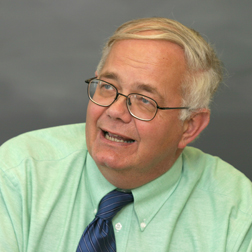 On 30 November 2008, Theologian William C. Placher died. He was the LaFollette Distinguished Professor in the Humanities at Wabash College and a prolific writer. I never met Dr. Placher but reading his works I felt I knew him; Placher was a constant companion for countless scholars in theology.
On 30 November 2008, Theologian William C. Placher died. He was the LaFollette Distinguished Professor in the Humanities at Wabash College and a prolific writer. I never met Dr. Placher but reading his works I felt I knew him; Placher was a constant companion for countless scholars in theology.
May his memory be eternal.
Some postings on Dr Placher:
What the vocation requires…Metropolitan Jonah tells
In a recent talk to the students, staff and faculty of Saint Vladimir’s Orthodox Theological Seminary, the newly
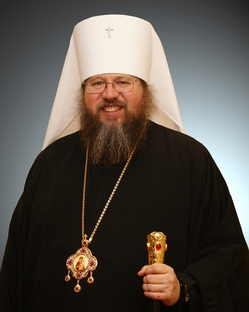 elected Metropolitan of the Orthodox Church in America, Jonah, said:
elected Metropolitan of the Orthodox Church in America, Jonah, said:
“All leaders of the Church, who take up the yoke of Christ must have a clear vision of theological education, which consists in four things: first, we must present the gospel of Jesus Christ; second, we have a mission to evangelize all people, regardless of color, ethnicity, or socio-economic status; third, we must bring integrity to the gospel message; and fourth, we must take up the task of bearing the presence of Jesus Christ to those around us.”
Apparently, he is big on the need to imitate the sacrificial path of Christ and his mother, the Virgin Mary. “To become the living presence of God, the living temple of God, requires us to crush our ego and shatter our will,” he said, “so that we might conceive God within us and become his presence in this world.”
“Seminarians,” he asserted, “do not come to theological schools to become ‘professionals’ and to be ‘respected,’ but rather to be crucified and thereby shine forth the light of Christ.” His Beatitude reminded the seminarians that his own title of “episkopos” means not “master of the house,” but “slave of slaves.”
This guy has a backbone. Watch out. I predict we’re going to hear more good things from His Beatitude. Are YOU on board with this view of Church, formation, and service?
Christian ethics is born in friendship with Christ
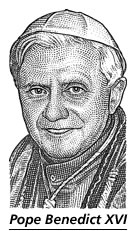 In last Wednesday’s catechesis [11/19], I spoke of the question of how man is justified before God. Following St. Paul, we have seen that man is not capable of making himself “just” with his own actions, but rather that he can truly become “just” before God only because God confers on him his “justice,” uniting him to Christ, his Son. And man obtains this union with Christ through faith.
In last Wednesday’s catechesis [11/19], I spoke of the question of how man is justified before God. Following St. Paul, we have seen that man is not capable of making himself “just” with his own actions, but rather that he can truly become “just” before God only because God confers on him his “justice,” uniting him to Christ, his Son. And man obtains this union with Christ through faith.
In this sense, St. Paul tells us: It is not our works, but our faith that makes us “just.” This faith, nevertheless, is not a thought, opinion or idea. This faith is communion with Christ, which the Lord entrusts to us and that because of this, becomes life in conformity with him. Or in other words, faith, if it is true and real, becomes love, charity — is expressed in charity. Faith without charity, without this fruit, would not be true faith. It would be a dead faith.
We have therefore discovered two levels in the last catechesis: that of the insufficiency of our works for achieving salvation, and that of “justification” through faith that produces the fruit of the Spirit. The confusion between these two levels down through the centuries has caused not a few misunderstandings in Christianity.
In this context it is important that St. Paul, in the Letter to the Galatians, puts emphasis on one hand, and in a radical way, on the gratuitousness of justification not by our efforts, and, at the same time, he emphasizes as well the relationship between faith and charity, between faith and works. “For in Christ Jesus, neither circumcision nor uncircumcision counts for anything, but only faith working through love” (Galatians 5:6). Consequently, there are on one hand the “works of the flesh,” which are fornication, impurity, debauchery, idolatry, etc. (Galatians 5:19-21), all of which are contrary to the faith. On the other hand is the action of the Holy Spirit, which nourishes Christian life stirring up “love, joy, peace, patience, kindness, generosity, faithfulness, gentleness, self-control” (Galatians 5:22): These are the fruits of the Spirit that arise from faith.
 At the beginning of this list of virtues is cited ágape, love, and at the end, self-control. In reality, the Spirit, who is the Love of the Father and the Son, infuses his first gift, ágape, into our hearts (cf. Romans 5:5); and ágape, love, to be fully expressed, demands self-control. Regarding the love of the Father and the Son, which comes to us and profoundly transforms our existence, I dedicated my first encyclical, Deus Caritas Est. Believers know that in mutual love the love of God and of Christ is incarnated by means of the Spirit.
At the beginning of this list of virtues is cited ágape, love, and at the end, self-control. In reality, the Spirit, who is the Love of the Father and the Son, infuses his first gift, ágape, into our hearts (cf. Romans 5:5); and ágape, love, to be fully expressed, demands self-control. Regarding the love of the Father and the Son, which comes to us and profoundly transforms our existence, I dedicated my first encyclical, Deus Caritas Est. Believers know that in mutual love the love of God and of Christ is incarnated by means of the Spirit.
Let us return to the Letter of the Galatians. Here, St. Paul says that believers complete the command of love by bearing each other’s burdens (cf. Galatians 6:2). Justified by the gift of faith in Christ, we are called to live in the love of Christ toward others, because it is by this criterion that we will be judged at the end of our existence. In reality, Paul does nothing more than repeat what Jesus himself had said, and which we recalled in the Gospel of last Sunday, in the parable of the Final Judgment.
In the First Letter to the Corinthians, St. Paul becomes expansive with his famous praise of love. It is the so-called hymn to charity: “If I speak in human and angelic tongues but do not have love, I am a resounding gong or a clashing cymbal. … Love is patient, love is kind. It is not jealous, (love) is not pompous, it is not inflated, it is not rude, it does not seek its own interests …” (1 Corinthians 13:1,4-5).
Christian love is so demanding because it springs from the total love of Christ for us: this love that demands from us, welcomes us, embraces us, sustains us, even torments us, because it obliges us to live no longer for ourselves, closed in on our egotism, but for “him who has died and risen for us” (cf. 2 Corinthians 5:15). The love of Christ makes us be in him this new creature (cf. 2 Corinthians 5:17), who enters to form part of his mystical body that is the Church.
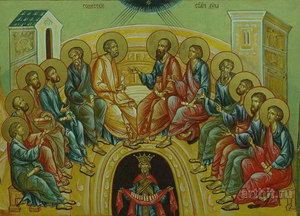 From this perspective, the centrality of justification without works, primary object of Paul’s preaching, is not in contradiction with the faith that operates in love. On the contrary, it demands that our very faith is expressed in a life according to the Spirit. Often, an unfounded contraposition has been seen between the theology of Paul and James, who says in his letter: “For just as a body without a spirit is dead, so also faith without works is dead” (2:26).
From this perspective, the centrality of justification without works, primary object of Paul’s preaching, is not in contradiction with the faith that operates in love. On the contrary, it demands that our very faith is expressed in a life according to the Spirit. Often, an unfounded contraposition has been seen between the theology of Paul and James, who says in his letter: “For just as a body without a spirit is dead, so also faith without works is dead” (2:26).
In reality, while Paul concerns himself above all with demonstrating that faith in Christ is necessary and sufficient, James highlights the consequent relationship between faith and works (cf. James 2:2-4). Therefore, for Paul and for James, faith operative in love witnesses to the gratuitous gift of justification in Christ. Salvation, received in Christ, needs to be protected and witnessed “with fear and trembling. For God is the one who, for his good purpose, works in you both to desire and to work. Do everything without grumbling or questioning … as you hold on to the word of life,” even St. Paul would say to the Christians of Philippi (cf. Philippians 2:12-14,16).
Often we tend to fall into the same misunderstandings that have characterized the community of Corinth: Those Christians thought that, having been gratuitously justified in Christ by faith, “everything was licit.” And they thought, and often it seems that the Christians of today think, that it is licit to create divisions in the Church, the body of Christ, to celebrate the Eucharist without concerning oneself with the brothers who are most needy, to aspire to the best charisms without realizing that they are members of each other, etc.
The consequences of a faith that is not incarnated in love are disastrous, because it is reduced to a most dangerous abuse and subjectivism for us and for our brothers. On the contrary, following St. Paul, we should renew our awareness of the fact that, precisely because we have been justified in Christ, we don’t belong to ourselves, but have been made into the temple of the Spirit and are called, therefore, to glorify God in our bodies and with the whole of our existence (cf. 1 Corinthians 6:19). It would be to scorn the inestimable value of justification if, having been bought at the high price of the blood of Christ, we didn’t glorify him with our body. In reality, this is precisely our “reasonable” and at the same time “spiritual” worship, for which Paul exhorts us to “offer your bodies as a living sacrifice, holy and pleasing to God” (Romans 12:1).
To what would be reduced a liturgy directed only to the Lord but that doesn’t become, at the same time, service of the brethren, a faith that is not expressed in charity? And the Apostle often puts his communities before the Final Judgment, on which occasion “we must all appear before the judgment seat of Christ, so that each one may receive recompense, according to what he did in the body, whether good or evil” (2 Corinthians 5:10; and cf. Romans 2:16).
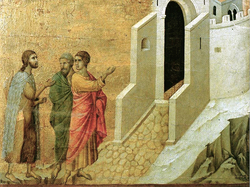 If the ethics that St. Paul proposes to believers does not lapse into forms of moralism, and if it shows itself to be current for us, it is because, each time, it always recommences from the personal and communitarian relationship with Christ, to verify itself in life according to the Spirit. This is essential: Christian ethics is not born from a system of commandments, but rather is the consequence of our friendship with Christ. This friendship influences life: If it is true, it incarnates and fulfills itself in love for neighbor. Hence, any ethical decline is not limited to the individual sphere, but at the same time, devalues personal and communitarian faith: From this it is derived and on this, it has a determinant effect.
If the ethics that St. Paul proposes to believers does not lapse into forms of moralism, and if it shows itself to be current for us, it is because, each time, it always recommences from the personal and communitarian relationship with Christ, to verify itself in life according to the Spirit. This is essential: Christian ethics is not born from a system of commandments, but rather is the consequence of our friendship with Christ. This friendship influences life: If it is true, it incarnates and fulfills itself in love for neighbor. Hence, any ethical decline is not limited to the individual sphere, but at the same time, devalues personal and communitarian faith: From this it is derived and on this, it has a determinant effect.
Let us, therefore, be overtaken by the reconciliation that God has given us in Christ, by God’s “crazy” love for us: No one and nothing could ever separate us from his love (cf. Romans 8:39). With this certainty we live. And this certainty gives us the strength to live concretely the faith that works in love.
Benedictus XVI
Pontiff of the Roman Church
26 November 2008

